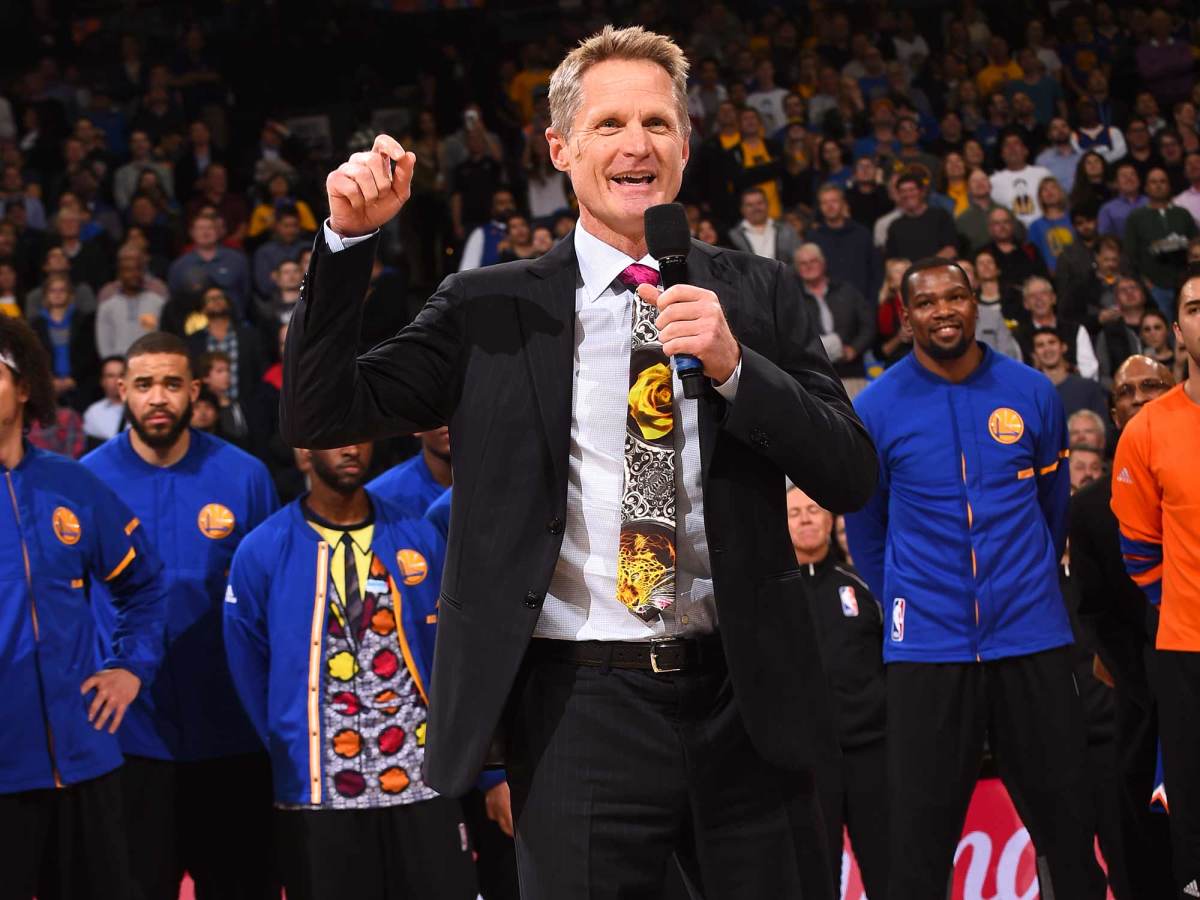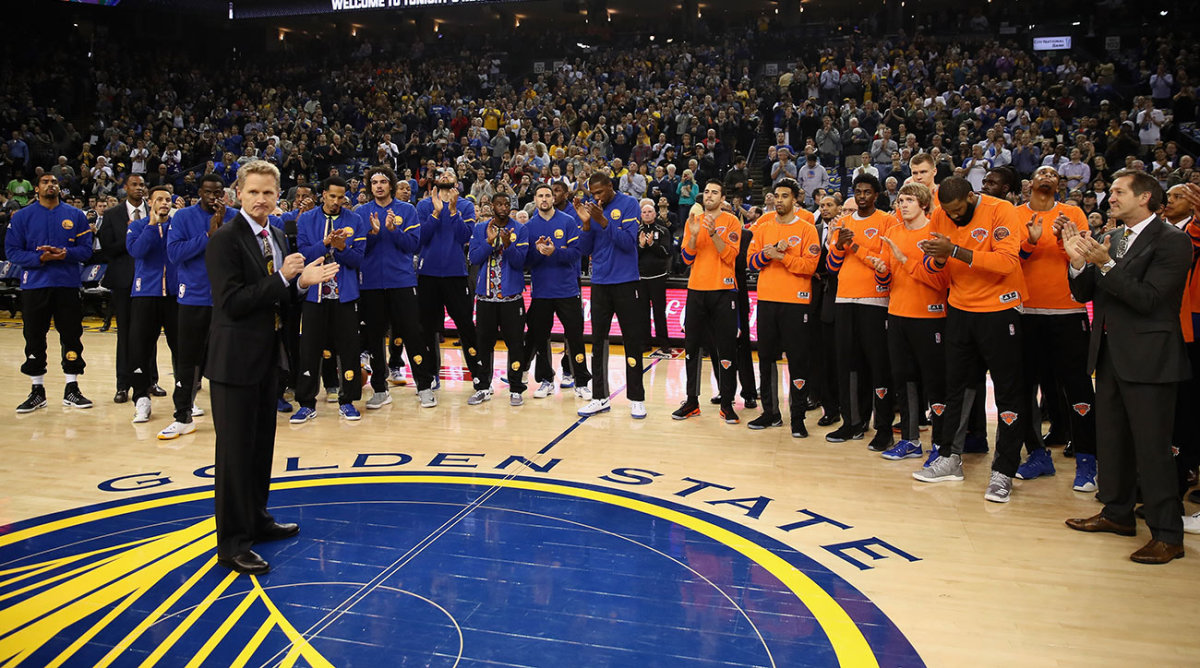A Moment Of Joy: The Perfect Send-Off For Craig Sager

OAKLAND, Calif. — There have been nights this season when Steve Kerr, the coach who turned the Warriors into the league’s most delightful team and then endured the worst collapse in Finals history, has been harsh. Unnecessarily harsh.
In Kevin Durant’s first game against the Thunder, he had to be restrained by assistant Mike Brown from pursuing an official, lest he earn an ejection. A few weeks later, he took to the radio to lambaste referees for missing traveling calls, drawing a fine from the league office. And, after a comfortable late-November win over the Lakers, Kerr claimed he had just witnessed “one of the worst basketball games I’ve ever seen in my life,” later reconsidering that hyperbole once he had a chance to sleep on it.
Kerr’s edge is sharp now, for many good reasons. He’s the type of man who hates losing more than he enjoys winning, and who knows his league’s history—and the 2016 Warriors’ place in it—better than anyone. He’s coaching the league’s most talented roster, a group whose biggest adversary, at least until Christmas, is complacency. He’s deep into year three of the immense scrutiny that surrounds title contenders. He’s intelligent enough to learn from last year’s mistakes and missteps. He’s probably spent a little bit too much time around Gregg Popovich, who would rather drink an entire box of Franzia than mince words.
So when Kerr began grumbling after Golden State’s latest routine butt-kicking, a 103-90 cruise-control win over New York on Thursday, it was tempting to ignore his complaints, or at least dismiss them as first-world NBA problems. It’s a long season, and the Warriors had just returned from a long road trip, and they had done far more than the bare minimum needed for victory, assisting on their first 36 field goals and sending the game to garbage time early.
“The lone bright spot was our willingness to share,” Kerr said, before plunging ahead with a list of desired improvements.
Yes, the Warriors had put on another peerless passing display, force-feeding JaVale McGee with lob dunks and tying up the Knicks’ defensive rotations into knots on the perimeter. But that wasn’t the only bright spot, nor was it the night’s brightest spot, a title that belonged to a different sort of sharing.
Craig Sager: Always on the bright side
Hours after Turner Sports announced that TNT sidelined reporter Craig Sager had died after a long battle with leukemia, Kerr was struggling through a pre-game press conference. “It’s a tough day,” he began. “It’s just a tough day,” he repeated, before dipping his toe into the frigid water of memories he didn’t seem to want to recount in detail just yet. “It’s not an easy day,” he concluded, before the subject finally changed from the loss of a longtime colleague—Kerr spent years as a TNT analyst after retiring from his playing career—to injury updates and starting lineups.
But by the time tip off came around, Kerr was willing to share, calling his players and the Knicks players to center court.
“He loved his family, he loved his friends, he loved Bud Light, he loved golf, he loved atmospheres like tonight,” Kerr said of Sager. “He loved the Cubs. He loved people, more than anything else.”

Kerr's harsh flashes that have surfaced this season were now buried in favor of a meticulous decency. He then called on the Oracle crowd to join him in honoring Sager in an unexpected fashion.
“We mourn his loss but while we considered a moment of silence, we thought it would be more appropriate, given the way Craig lived his life, and the joy he brought to so many people, to have a moment of joy instead,” Kerr explained. “I would like all of you to join me in an applause for a great man and a life well lived.”
The NBA Will Never Forget Craig Sager
The ensuing ovation was respectful, not raucous, and everyone participated. Durant, Shaun Livingston, and Ian Clark clapped after donning garish tribute shirts during warm-ups, and they were joined by their Warriors teammates. Nearby, the Knicks, pulled tight into a semicircle behind Kerr, clapped along.
Game operations staff members clapped. Cheerleaders clapped through pom-poms. The game’s three referees—Jason Phillips, Tyler Ford and Gary Zielinski, stood clapping near the sideline. TNT’s crew clapped. Fans in every section, all on their feet, clapped and clapped as Sager’s picture appeared on the JumboTron.
For months, this slice of the NBA community, like others across the country, had followed Sager’s fight through twists and harrowing turns, embracing his increasingly rare appearances at games and fretting over dire diagnoses. Perhaps joy was impossible in such a moment, but Kerr summoned a building full of admiration and respect.
Kerr’s willingness to share his grief, to strain towards a fitting and upbeat tribute for the league’s most colorful character, begat more sharing.
After the game, Durant marveled at Sager’s holiday spirit. “I remember Craig sending me Christmas cards every year,” he said. “Just a stand up person, a great man. … His name is going to live forever.”

Draymond Green brightened as he thought back to the first time his path crossed with Sager, during his rookie season.
“The first thing I looked at was, yep, he’s got something crazy on,” Green said. “All these years, you’ve watched [Kevin Garnett] at All-Star Weekend talk about his outfits, or [Popovich] go crazy about [Sager’s] outfits. Then you actually get to see it in person. It was a pretty surreal moment for me. He’s been doing this since before I was born. Ever since I could remember watching the TNT game, it was Craig.”
To Green, perhaps the brashest voice in a sport whose stars have been consumed by fashion, Sager was no mere media member—he was a trendsetter and a role model.
“He brought swagger into the league,” Green said. “Dressing however you wanted. Not caring what anybody said. I think you see a lot of people do it today. He brought that in with him.”
Kerr nitpicked his team’s play in direct and forceful language, but he seemed to pace himself when talking about Sager to steady his emotions. Durant sounded like he was fighting disbelief, while shaking his head in gratitude. Green let the words flow naturally, as always, but he broke into a smile thinking about Sager’s self-confidence. Piece by piece, Kerr and his players had captured Sager, the freewheeling golfing buddy, the thoughtful family man, the ubiquitous reporter, the fearless peacock. This was a man who left behind devastated colleagues, grateful friends, and awestruck admirers alike.
“There were a lot of fun nights on the road,” Kerr remembered, finally. “Although, with Sages, you only saw him for about 15 minutes because he had to move on to the next bar or restaurant to see the next group of people. He literally couldn’t sit still, and he knew so many people that he was constantly on the run.”
Sager's wasn't physically at Oracle Arena on Thursday, but he still filled the same role he had for decades. Here, illuminated by his lifetime of interactions, was the night’s brightest spot, now so clearly revealed.
